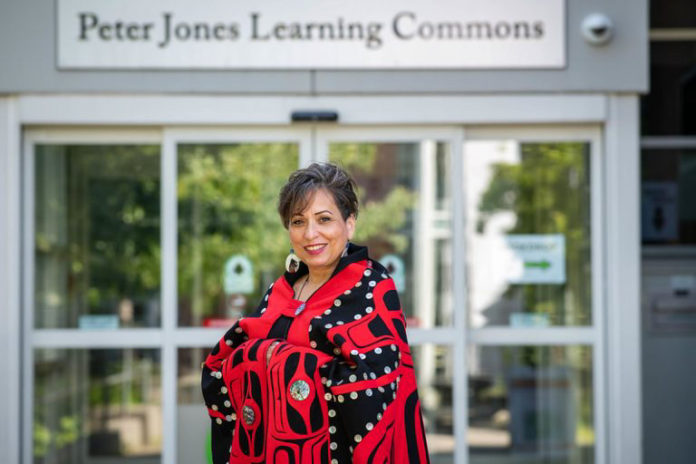Over the summer, UFV appointed Camille Callison as the new University Librarian. Callison credits Kim Isaac, UFV’s previous University Librarian, for the strong foundation she established during her 21 year tenure.
Callison comes from the Tsesk’iya (Crow) clan of the Tahltan First Nation, and was born and raised in British Columbia. She has served terms on various committees, including founding board member and Chair of both the Indigenous Matters and the Truth and Reconciliation committees for the Canadian Federation of Library Associations (CFLA). Callison formerly served as Chair of the Indigenous Matters Section of the International Federation of Library Associations (IFLA), was a member of IFLA’s Cultural Heritage Programme Advisory Committee, and was recently elected as one of IFLA’s eight Professional Division Committee Chairs. She previously worked at the University of Manitoba, starting as the Indigenous Services Librarian and Liaison Librarian for Anthropology, Native Studies, and Social Work before transitioning to Learning and Organization Development Librarian (2018-2019), and later the Indigenous Strategies Librarian (2019-2021).
One of Callison’s key missions is not only to provide research services for students, but to ensure that the information they have is peer-reviewed by professionals and academics to support them in their studies. While she believes Google is an important service to have, she states it can be challenging for students to navigate thousands of results and determine which information is accurate and which is unfounded.
Callison explained how librarians were instrumental to academia’s online-only transition, aiding faculty and students with utilizing online programs and technology such as BlackBoard and Zoom, using e-books and e-resources, and properly navigating research databases. Callison’s passion for libraries and technology make her excited to continue the groundwork UFV has already established and bring forward her knowledge and teachings.
“Not enough can be said about how libraries created a quasi-normal setting [during the start of the pandemic] for students and staff. UFV did an amazing job transferring everything online and ensuring people still had access to resources,” Callison said.
Another one of Callison’s goals is to bridge cultural heritage with the library, and she applauded UFV Library’s AskAway program, especially with how its anonymity helps provide the best assistance without allowing room for unrecognized biases. Callison also highlighted how our language has shifted in recent years, from inappropriate or antiquated terminologies such as “Native Studies” or books with racist depictions such as The Indian in the Cupboard. In comparison to countries like the United States and Australia, Callison says that Canada is behind in training people to work with their own cultural knowledge. To aid in this gap, she developed, piloted, and co-facilitated a curriculum for Indigenous cross-cultural training so that all library faculty and staff from the University of Manitoba can receive culturally relevant information, as well as help maintain student retention and success in their studies by creating a more welcoming space.
“I’m dedicated to providing library services for all. There isn’t anyone I’ve met who hasn’t taught me something. We’re all equal to each other.”
Image: Darren McDonald


